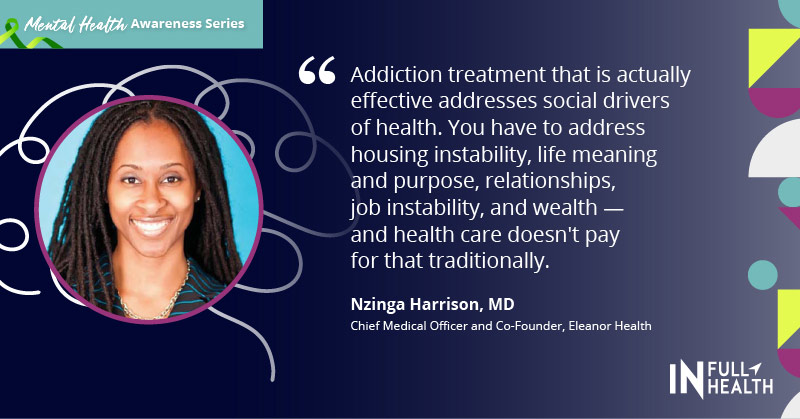[vc_row][vc_column][vc_column_text]Nzinga Harrison, MD (she/her) is the Chief Medical Officer and Co-Founder of Eleanor Health. Eleanor Health provides mental health and substance abuse services rooted in its community members’ values, cultures, and life experiences.
![]() Eleanor Health — inspired by the Greek meaning of the name Eleanor, “shining light” — is dedicated to transforming the quality, delivery, and accessibility of addiction treatment using value-based and whole-person approaches to care.
Eleanor Health — inspired by the Greek meaning of the name Eleanor, “shining light” — is dedicated to transforming the quality, delivery, and accessibility of addiction treatment using value-based and whole-person approaches to care.
In our series for Mental Health Awareness Month, Dr. Harrison shares how Eleanor Health is helping to not just make mental health and addiction treatment services more available, but also to make them better for all communities and individuals.
In Full Health (IFH): What unique obstacles impact access to and quality of addiction treatment for historically marginalized communities?
Dr. Nzinga Harrison: There are so many barriers we tend to think about — biological, psychological, social, cultural, and political variables.
We can start with just the way the health care system is structured. Fee for services is overwhelmingly the way addiction care is paid for. You get a service, the provider drops a claim to insurance (if you’re lucky to have insurance), and you pay a bill. That automatically marginalizes communities that have lower access to health care — those communities being certainly Black and Brown communities, LGBTQ communities, rural communities, and communities with lower access to socioeconomic assets. If you can’t pay for addiction treatments, they will not be available to you. That is compounded by a lack of whole-person addiction treatment.
While those things we know drive risk for developing a substance use disorder in the first place — and definitely drive risk for substance use disorders worsening — the responsibility for those factors has been considered to be outside of health care. This decreases the health care provider’s ability to address those needs while running a financially sustainable business.
Then we certainly have to look at structural racism and discrimination in this country, which increases the chance that Black and Brown people will be in lower socioeconomic conditions, be in incarcerated settings, not have health insurance, and not be employed.
IFH: How does your organization address these obstacles?
Dr. Nzinga Harrison: First, being absolutely and utterly explicit that equity is our responsibility as a health care provider. That equals thinking of equity in every major function of the organization, from the people we recruit to be on our team to the people that we provide care for. We’re looking at our clinical outcomes along those domains — those defined populations that have been historically marginalized, looking for disparities, and enacting strategic interventions to try to address those disparities.
Tied for first is providing value-based care and population health care. We provide whole-person addiction care in value-based arrangements that allow us to address those social drivers of health. But also we are at risk for the clinical and life outcomes of the people that we’re serving. So if those folks don’t get better, our financial sustainability is at risk.
When a person is not connected to us, we know that there is an increased chance that their outcomes are going to be poor. So, we have really robust re-engagement protocols that use data.
Dr. Nzinga Harrison, MD
Chief Medical Officer and Co-Founder, Eleanor Health
We look at hospital and emergency department feeds to find our people. If you miss an appointment in another organization, you just get closed out or maybe nobody even notices that you missed. We notice because we know that retention and keeping that connection drive our outcome.
The last thing I’ll say is — we really believe data and technology have to supplement human-delivered health care for efficiency and effectiveness purposes. In a value-based arrangement — when our financial sustainability is contingent on clinical outcomes — we invest in that technology and data that helps us to know what interventions are helping our population that we’re serving.
SUBSCRIBE
Stay in the loop about new blog posts from equitable health innovation leaders, helpful resources and tools to help you bring the Principles to life, upcoming events, and more by joining our email list.
SUBSCRIBEIFH: Eleanor Health emphasizes the importance of community, culture, and life experiences in the treatment of mental health. How are you putting those who have historically been ignored when it comes to mental health at the front and center of your organization and its work?
Dr. Nzinga Harrison: If you apply for a job at Eleanor Health, you will hear that equity and justice are at the center of who we are. If you join our team member community, you’ll have training on cultural oppression, racism, and recovery. We invite everyone to do implicit bias testing and talk about that in safe and open forums.
We have a safe space for our team members who identify as Black called Black Eleanor, which is an hour a month that we dedicate to anyone who identifies as Black to be together in a safe space — no agenda.
We have our Black Lives Matter committee, which is responsible for holding the company accountable to our antiracism commitment. And we’re working to build out those same types of initiatives for other communities who have been historically marginalized.
Our goal is to create a sense of belonging for our team members and teach ourselves to have conversations around racism, oppression, and discrimination. Then, we can then have those conversations with our community members we’re providing services to, knowing that their experiences with those same forces affect their health.

Expressing Gratitude
Michael Moeller, Chief People Officer of Eleanor Health, is an incredible expert in designing a compassionate, inclusive culture that drives a sense of belonging and operationalizing. Without Michael’s leadership on the ground floor, we would not be operationalizing our intentions the way we are today.
Dr. Nzinga Harrison, MD
Chief Medical Officer and Co-Founder, Eleanor Health
IFH: How do you measure the impact of your solution?
Dr. Nzinga Harrison: We’re learning. We have our intention figured out around equity and justice. But we’re learning how to operationalize that. We say at Eleanor Health — the only thing that’s not acceptable is not trying.
From a clinical model perspective, we measure ourselves rigorously. We align the company to the Quadruple Aim, which is improved population health, staff satisfaction, patient satisfaction, and reduced total cost of care. A new concept recently came out which is the Quintuple Aim — it changes from a square to a star, with the fifth point on the star being equity. So we’re working hard now to slide what we’re measuring from Quadruple Aim to Quintuple Aim.
We measure for the populations we serve, and we take care of people at every phase of substance use disorders — during periods of active use, remission, relapse, and maintenance. We measure improvement in mental health, substance use, physical health, and social drivers of health. But we are still figuring out how to best measure our efforts on equity and belonging.
IFH: How can the In Full Health Learning & Action Community help you strengthen and scale your solution and its impact on the health of the communities you serve?
Dr. Nzinga Harrison: We’re currently serving in North Carolina, New Jersey, Washington, Ohio, Louisiana, and Massachusetts. Texas will open in July. We are, of course, always looking for payer partners who would like to design innovative payment models with us that allow us to deliver this whole-person care model.
We also take it very seriously that building community is part of health, and we want to be good stewards of the community. We want to help the community create opportunities, not just for those who are being served by Eleanor Health.
Connect with us and reach out if you’re in any of those existing markets, so we can think through what partnering to be good community stewards looks like.
SUBSCRIBE
Stay in the loop about new blog posts from equitable health innovation leaders, helpful resources and tools to help you bring the Principles to life, upcoming events, and more by joining our email list.
SUBSCRIBE

